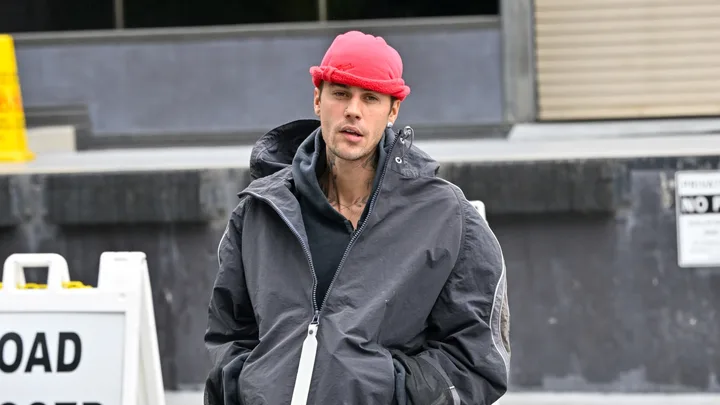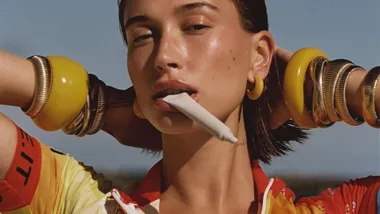When Justin Bieber posted a candid message to Instagram this week – “Don’t you think if I could have fixed myself I would have already?” – it felt less like a pop star venting and more like a breaking point. We felt what Bieber was saying: he’s exhausted. And yet, it was also depressingly predictable. Because Bieber’s unraveling has been playing out for years. It’s just that we – the public, the press, the fans – are only now beginning to admit what we always knew. That is, he was never going to escape the curse of childhood fame.
He’s 31 now, an age when most people are starting to figure themselves out (sort of). But for Bieber, the figuring out is messier, more public, and naturally, far more complicated. Because when your adolescence is a global commodity, you don’t get to grow up like everyone else. You don’t get to rebel in private, fall apart in peace, or rage without the world watching. Fame at that scale is its own form of trauma – one that distorts everything from relationships to self-worth.
And yes, it’s a story that feels very familiar. Too much, too young is the oldest lesson in celebrity. But we’re still shocked when it plays out in real time. It’s as if every generation has to learn it all over again – Judy Garland, Britney Spears, Lindsay Lohan, now Bieber. He was never going to emerge from the eye of that storm unscathed. The question is – why do we keep acting like he should?
What’s Been Happening With Justin Bieber?
Since March, Bieber has been communicating almost exclusively in cryptic Instagram captions and screenshots. One post reads: “I know I’m broken. I know I have anger issues.” Another: “Tired of transactional relationships.” And then, there’s the string of messages ending in a friendship breakup, with a now-infamous closer: “This confirms u were the pussy I always thought u were.” It’s hurt, it’s rage, it’s someone struggling not to implode.
Of course, he’s mocked for it. Memed, dissected, dismissed. But peel back the posture and what you see is a man in distress. He’s been asking for help in the only way he knows how – and we’ve trained him to do it in front of 292 million followers.
What’s happening with Bieber isn’t just a mental health crisis, though. It’s a mirror held up to our culture’s warped obsession with celebrity. We built him up. We broke him down. We monetised every moment of his life – from his first floppy-haired YouTube videos to his heartbreaks, misdemeanors, baptisms and breakdowns. And now, we expect him to apologise for being affected by it.

The idea of the “comeback” looms over all this – as if healing is just a matter of time and good PR. That’s the cycle, right? Public collapse, quiet rehab, a redemption arc on Ellen or a Netflix documentary. But what if there’s no comeback? What if there’s no “before” to return to? When you’ve been famous since you were 14, there is no normal. There is only the grind – of attention, validation, and expectations you never chose for yourself.
Bieber’s Christian faith now seems to be one of the few stable anchors in his life. “Jesus is the only person who keeps me wanting to make my life about others,” he wrote. It might read like spiritual bypassing, but it also suggests something deeper: he’s searching for meaning beyond himself. For someone who’s spent years being told he’s special, maybe that’s the most radical thing he can do – believe in something bigger.
There’s a temptation to roll our eyes. To scoff at the idea that a millionaire with a private jet could feel this broken. But we’ve seen this story enough times to know money doesn’t insulate you from pain. If anything, it isolates you. It breeds mistrust, co-dependency, performance. When everyone around you is paid to be there, how do you know who’s real?
Why Can’t We Look Away?
And then there’s the darker truth: we like to see young stars spiral. It makes us feel smarter, saner, safer. Their chaos distracts from our own. Their public meltdowns serve as cautionary tales, but also as entertainment. We say we care, but what we really want is access – to the spectacle, the breakdown, the apology.
So yes, Justin Bieber is angry. He’s hurt. He’s lashing out. But perhaps the most surprising thing is that it’s taken this long for him to say it so plainly.
What If There Is No Comeback?
The moral of Bieber’s story isn’t tidy. It’s not redemptive or cautionary or finished. It’s messy and ongoing, and maybe that’s the point. Maybe we need to stop expecting our teen idols to emerge unscathed from an industry designed to consume them. Maybe the real scandal isn’t his meltdown, but the fact that we still haven’t figured out how to let people grow up without burning out.
Because if Justin Bieber, with all his resources and reach, still feels this lost – what does that say about the rest of us?

